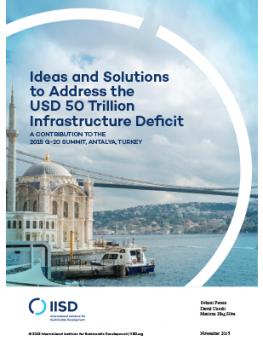
Ideas and Solutions to Address the USD 50 Trillion Infrastructure Deficit: A contribution to the 2015 G-20 Summit, Antalya, Turkey
The opportunity costs of not addressing the global infrastructure deficit are too high.
According to Brodhead, Darling, and Mullin (2014), for every USD 1 billion spent on infrastructure, 16,700 jobs are supported annually, and GDP is boosted by USD 1.14 billion resulting in a multiplier effect of 1.143. Investment in infrastructure brings tangible economic returns even before projects are completed, as the construction stage alone generates sufficient multipliers to justify the expense.
This report presents a broad brush review of how G-20 countries can begin to address their infrastructure gap and understand why this gap arose in the first place, though not all issues are discussed here. There is a very strong need for project development funds to cover the costs of robust project preparation. As well, there is a powerful case for fiscal allowances and performance-based incentives to encourage the wider deployment of sustainable assets. Moreover, there is so much attention paid to the structuring of deals that their longer-term affordability is often overlooked. IISD looks forward to deepening this debate, further examining the ideas proposed in this report and contributing to the leadership discourse of the G-20 in addressing this challenge.
Participating experts
You might also be interested in
Green Public Procurement in India
This report analyzes the status of green public procurement (GPP) in India and suggests key strategies for advancing sustainable procurement practices.
The Role of Multilateral Development Banks for Low-Carbon Procurement in the Infrastructure Sector
This report examines the critical role of multilateral development banks (MDBs) in advancing low-carbon procurement within the infrastructure sector.
Green Public Procurement in Indonesia
This report explores the state of green public procurement (GPP) in Indonesia and offers key strategies for advancing sustainable procurement practices.
Monitoring Progress in Green Public Procurement
This report outlines the importance of monitoring progress in green public procurement (GPP) and highlights various methodologies, challenges, and recommendations.